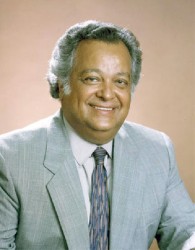The following address was given by Ian McDonald at the launching of Sir Shridath Ramphal’s memoirs Glimpses of a Global Life on Thursday, November 26 at the Georgetown Club.
It is a great honour to be asked to play a part in launching Sir Shridath’s memoir, Glimpses of a Global Life, in his homeland. I have this hope that some of his distinction will be bound to rub off on me.
Let me say at once, here we have a major world statesman of the 20th century who has written a remarkable book about international affairs in his time, and in particular one that tells us about some of the greatest struggles for freedom in the modern era.

This book will certainly become a classic of its kind. This is an account to be reckoned with by scholars and professionals as well as the general reader, by those who like their history close up and brimming with immediate life and drama, by those who want to know the inside story of the momentous events which led to freedom for much of Africa, by those who especially look for vivid pen portraits of the movers and shakers who strode the corridors of world power, and certainly by all those who enjoy clear, vivid and beautifully composed writing by a master in the craft.
As you might expect of the author of some of the most inspiring addresses of his time there is no part of this book which is anything short of fascinating and instructive – from the account of ancestry and family, to his youth and education and starting out in the world, to his role in the brave but doomed world of Federation, to his increasingly influential role as Guyana’s Foreign Minister, to his elevation to the Secretary Generalship of the Commonwealth, which he immediately infused with his dynamism, and so to his rapid rise into the topmost councils of world leaders.
Since I am sure you will be reading this book I will not describe the details and dramas except to say that while all the chapters hold their pin-pointed interest, those chapters on the long fight for freedom in Southern Africa, the campaign against apartheid and the moving chapter on Nelson Mandela are extraordinarily powerful and will surely add discoveries and details for the historical record never previously divulged.
There is of course a considerable West Indian dimension in the story. As a West Indian by conviction myself, the pages about Sonny Ramphal’s life-long devotion to the cause of a more unified West Indies are of particular interest to me. Nobody reading the chapters ‘The Federal Dream’ and ‘The Caribbean Vineyard’ can fail to be impressed by the author’s dedication to the cause and saddened by the frustrations.
Sonny has never lost the fervour of his desire to see the achievement of a closer and therefore stronger Caribbean Community. I cannot believe that the monumental work Sonny Ramphal has done in the cause of bringing West Indians together, his vision of greater influence through West Indian solidarity, his splendid determination to strengthen West Indian institutions, will not one day prevail.
I still have, and treasure, a small plaque he sent me as a memento of the West Indian Commission with the great lines from Derek Walcott’s Omeros inscribed on it:
Why waste lines on Achille, a shade
on the sea-floor? Because strong
as self-healing coral, a quiet culture
branching from the white ribs of
each ancestor, deeper than it seems
on the surface, slowly but sure,
it will change us with the flu
sculpture of time!
I suppose Sir Shridath could have written this book as a long and self-approving litany of successes and achievements – there are plenty of those. But it is far from that. He is very clear about the frustrations, failures, wrong turnings, setbacks and shortcomings which mark all careers, however illustrious. He is at pains to set down the shadows as well as the sun-bursts. In fact I am inclined to say that the writing becomes especially strong where failure and/or disaster or near disaster are addressed.
Perhaps this is because success is already well known and on the record while failure is more ‘hidden from history’ and therefore more compelling. It is human nature for the teller to dwell on success but equally it is human nature for the reader to want to hear about debacle. Sir Shridath lets us know what went wrong as well as what went right.
It is hard to encompass in a single address the range of a major lifetime of history – set down in a magisterial book. But let me attempt a summing up of the life-work of this one man.
In the last three decades of the 20th century Sonny Ramphal was at or near the centre of world affairs. He was the chief architect of the Lome Convention, that imaginative partnership between rich countries, the European Union, and poor countries, the ACP group, which promised so much for a fairer world until it fell foul of the free market fanatics of a more selfish time. As Secretary-General of the Commonwealth he participated in countless international crises, debates and decisions, and in particular powerfully assisted in freedom for Zimbabwe and in the birth of a democratic, apartheid-free South Africa.
He was also the indispensable common denominator – no one else belonged to them all – in the work of the five great international commissions which formulated a comprehensive vision of a better world: the Brandt Commission on Development; the Palme Commission on Disarmament and Security; the World Commission on Environment and Development; the Independent Commission on International Humanitarian Issues; and the South Commission on the major problems facing Third World countries. He was the dynamo in them all. It was an almost unbelievably unique summons to duty. Imagine the time, the researched knowledge, the daily stint of hard work and thought, the fervour devoted to those five great blueprints for humanity. These will continue to have relevance as long as man aspires to shape a real community of nations.
Sonny Ramphal was led by a vision of the world politically free, economically fairer, culturally more open, environmentally safer and more at peace. Time and again he joined with those who strive to bring the world together in advancing the planet’s security and prosperity. Many times he nudged mankind hard in the right direction. I believe he must be considered one of those rare persons who has been able to bend the mostly inflexible arc of history towards a place of greater justice.
There can be no doubt that Sir Shridath would have been, in a natural culmination of his career, a dynamic United Nations Secretary-General in the tradition of the great Dag Hammarskjold. This book tells us how it was that what must have seemed an obvious and valuable international appointment was stymied basically because his inclination to act independently and vigorously was not acceptable at the great power veto level. All I can say is that the world missed much.
I have known Sonny Ramphal for more than 40 years. His friendship has been important to me. Our paths in life have quite often crossed in these past few decades. In particular I worked within touching distance of Sir Shridath when he was playing a huge role in negotiating the Sugar Protocol as an integral part of the Lome Convention. That negotiation alone – one of his multitude of diplomatic victories – made a difference for good in the lives of hundreds of thousands in poorer countries.
Then in 1991-92 I worked as Editorial Assistant in the West Indian Commission of which Sir Shridath was a most vigorous and pro-active Chairman. He inspired everyone involved on a daily basis. If that is how he worked all the time no wonder he got big results.
Times spent with Sonny Ramphal were always exhilarating and I remember them vividly. I observed at first hand his enlivening gifts which spurred people on – and could easily see how they gave rise to his legendary achievements as a regional and world statesman: his supreme ability as a negotiator, the elegance of his writing – so evident in the book we are launching today – and reflected in the eloquence of his oratory, his capacity for taking endless pains and tenaciously holding on until the job gets done, the courteous but steely persuasiveness which drives men on; and also the breadth of vision which makes doubters into believers and believers into fervent apostles. And there was always something else which I have found without fail in all the exceptional people I have been fortunate enough to know – working with him, getting things done with him, sharing his ideas and enthusiasm made life and the world more exciting, and vibrantly more fun – simple as that.
When I first read Sonny’s book, Glimpses Of A Global Life, which he kindly sent me in typescript, I found that it was so clearly and elegantly composed and one of the most interesting and important books about international affairs and high diplomacy that I had ever read.
Only one thing worried me a little. I thought the low-key title did not do justice to this formidable book and the remarkable tales it had to tell. For a start, these are not “glimpses” that we are given. They are major revelations, history-stirring accounts with deep insights into profoundly important matters. An admirable modesty no doubt informed Sonny’s choice of title but I believe it hides the true weight and importance of the contents of this exceptional book.
Reading this book I was struck by the large impact Sir Shridath made in achieving better relations in the world and improving the world’s chances for a better future. Indeed he was with astonishing regularity either one who at the highest level of statesmanship strove to bind up very obvious wounds in the international body politic or, in the great commissions he was appointed to, became a major contributor among wise men to setting out how the world might evolve into a better and healthier and safer place. Given the central role he so frequently played as one of the first responders in a wounded world it seemed to me his book might very appropriately be titled A World to Heal.
Of course the title is what it is and what matters are the contents. But I am convinced that A World to Heal captures the nature of the tale this book has to tell – the tale of a most remarkable Guyanese and West Indian who became an outstanding international statesman – the tale of one who found ways at the highest level to help fix great wrongs in the world.
I am honoured to have lived part of my life in the company of and with the friendship of Sonny Ramphal. And today I am especially pleased to play a role in the launching of this book so expressive of the great events and achievements of his life.
I have long believed that Sir Shridath is one of the foremost statesmen of the 20th century. In this memoir of his life he records in vivid, clear and elegant prose the wide-ranging scale of that statesmanship, the trials and tribulations that had to be overcome, and the larger than life men and women in whose company he worked and with whom, in at least one case, he had to join in battle in order to get things done.
Friends and distinguished guests, it is the living stuff of history which you will hold in your hands when you hold this book.









